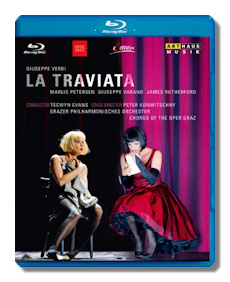
The Internet's Premier Classical Music Source
Related Links
- Verdi Reviews
- Latest Reviews
- More Reviews
-
By Composer
-
Collections
DVD & Blu-ray
Books
Concert Reviews
Articles/Interviews
Software
Audio
Search Amazon
Recommended Links
Site News
 Blu-ray Review
Blu-ray Review
Giuseppe Verdi

La Traviata
- Violetta Valéry - Marlis Petersen
- Flora Bervoix - Kristina Antonie
- Fehrs Annina - Fran Lubahn
- Alfredo Germont - Giuseppe Varano
- Giorgio Germont - James Rutherford
- Gastone - Taylan Memioglu
- Barone Douphol - Ivan Oreščanin
- Marchese d'Obigny - David McShane
- Dottor Grenvil - Konstantin Sfiris
Graz Opera Chorus/Berhard Schneider
Graz Philharmonic Orchestra/Tecwyn Evans
Peter Konwitschny, stage director
Johannes Leiacker, set and costume designer
Joachim Klein, lighting designer
Recorded Live Graz Opera, 2011
Bonus Track – Interviews with Marlis Petersen, Peter Konwitschny, etc.
Arthaus Musik Blu-ray 108036 110min + Bonus feature 20 mins LPCM Stereo DTS-HD Master Audio
Also available on DVD 101587: Amazon - UK - Germany - Canada - France - Japan - ArkivMusic - CD Universe - JPC
This production of Verdi's masterpiece is quite different from most, maybe all, others the listener has ever encountered before. There are basically two issues here that set this La Traviata apart from others: sets are practically non-existent (it's almost as if we are given a concert production with characters in costume) and there are a fair amount of cuts (Act 2 Gypsy dance, Matador chorus, Germont's No, non udrai rimproveri, and several others). The performance takes place on stage with only the curtains in the background. Actually, there is a chair used throughout and some books and cards in Act 2 that serve as the lone components of what one might call sets.
If this seems like two strikes against this production, there are many strengths here to offset these possible shortcomings: Marlis Petersen turns in an excellent portrayal of Violetta. Her Ah fors è lui, from Act 1 is stunning, and her Act 3 Addio del passato is darkly powerful and meltingly beautiful. She is simply a splendid Violetta throughout. Giuseppe Varano, who portrays a somewhat nerdy, understated Alfredo, is also good, though his voice, while pleasant and attractive, is by contrast considerably less powerful than Ms. Petersen's. James Rutherford is also impressive as Germont, and the rest of the cast is quite fine.
In addition, Tecwyn Evans draws fine, crisp playing from the orchestra, scaling things down a bit to give the performance a more intimate sense. The chorus sings well and the sound reproduction and camera work are excellent. In sum, one might call this a deliberately modest production, an attempt to take on a more introspective approach to this complex opera. Clearly, by cutting some of the more splashy music and imparting an understated character to the proceedings, this production moves away from most traditional ones of this opera. Does it work? The more I watched it, the more I liked it. I'm not sure that the several instances of characters singing from the aisles in the opera house were effective, but everything else worked quite well. In fact, considering that many modern operatic productions offer very sparse sets anyway, often with a puzzling or distracting design, Peter Konwitschny's barren stage approach actually strikes the viewer as a more straightforward and less meddlesome treatment. Those favoring more traditional productions might find this a problematic effort, but most others will discover much to enjoy and admire here.
Copyright © 2012, Robert Cummings





















